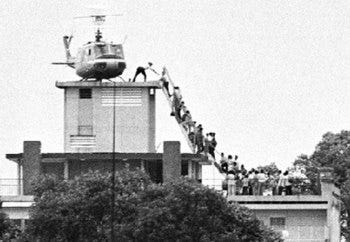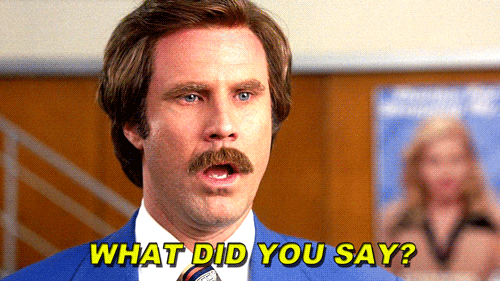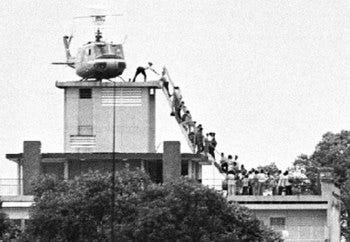Practicing Right Speech in the Face of Injustice
And reflecting on the 50th Anniversary of the Fall of Saigon
Yesterday was my sister’s 50th birthday. For as long as I can remember, her birthday has always been mentioned in the context of one of the most historical moments in Vietnam’s history — the Fall of Saigon.
The Fall of Saigon (April 30, 1975) marked the end of a 20-year war, where North and South Vietnam, brothers and sisters, fought against each other ruthlessly. For many, this day was a celebration of the reunification of Vietnam who had been under another country’s rule for hundreds of years; but for most, like my parents, it was a day that would forever change the course of their lives, one where they were forced to live under a totalitarian, oppressive government that was Communism.

When I look at this picture, now visually synonymous with not just the Fall of Saigon but with one of the most significant, expensive military defeats that the United States has lost in the name of democracy, it’s still hard for me to believe that my parents saw this very moment in time. My mother cradled my newborn sister as she and my father watched their country burn to the ground.
Shortly after my sister was born, my father was captured by the VietCong and put in a prisoner-of-war or what they called a “reeducation” camp where the Communists taught you a new way of living, speaking, being, according to how they saw the world. My father survived off of eating plant roots, bugs and field vermin that he would sneak under his tattered clothes, toiling away tilling rice paddy fields under the hot Vietnam sun for endless, inhumane hours.
He was there for two and half years as my mother searched for him while raising my sister, a baby. My mother spent those two and half years being intimidated by VietCong officers, where she was encouraged to spy and report on her neighbors and forced to watch the public executions of anyone who did not follow the “Communist” way of living. During this time, she took any odd job she could and gave all her food rations to my sister, leaving her malnourished and stricken with tuberculosis. And despite the encouragement of others to leave, she stayed and searched for my father.
She found him, and they, like so many hundreds of thousands of others, left Vietnam in the bowels of a fishing boat towards safety.
It was because of all of this, their suffering, their hardship, their triumph, their survival, their resilience that made it possible for me to be writing this to you, right here, right now. I recently taught a class on honoring your ancestors at Williams College and every time I tell my parents story, I think of all the things that could have happened that would have changed the course of my parents’ and by effect my own life. (I’ll be posting the transcript of those full talks and practices in an upcoming newsletter for you soon!)
This is just a bit of their story and I would invite you to listen to it in full below. Not just to get to know me a bit more but to see the parallels of what is happening in America today with what they went through. So next time you might want to endlessly doomscroll on your phone, I’d invite you instead to experience a world, a history you might not otherwise know and be inspired by their love story. I certainly am and feel lucky and grateful to call them my parents.
When I share my parents’ story now, I can’t help but notice the eerie similarities to what we are seeing unfolding in front of our eyes. From Trump encouraging Americans to report immigrants who are “a danger to society” to how certain people, like Mohsen Mahdawi, are being isolated and targeted as political capital for standing with Palestine without due process or oversight to our trans siblings being erased from the very site where the LGBTQIA+ movement began. The list goes on and on.
It is important to acknowledge — to not look away — at the fact that we are at the beginnings of authoritarianism and it is our work and our responsibility as citizens of this country to speak up before it’s too late. And much like every action made a difference in my parents’ survival, I deeply believe that every single one of our actions matter right now as well.
More than ever.
On Right Speech

Right Speech (Sammā Vācā in Pali) is a key tenant in the Eightfold Path in Buddhism. The Eightfold Path is a core teaching that is the For Dummies Guide on how to overcome suffering in this lifetime and reach a state of nirvana — or liberation.
The Four Key components (Buddhists love lists more than Buzzfeed) to Right Speech are:
Abstaining from false speech
Abstaining from slanderous speech
Abstaining from harsh speech
Abstaining from idle chatter
The modern, Kim Thai interpretation of this is:
Don’t lie!
Don’t say bad things about other people
Try to use kind, compassionate words when you talk
Be discerning when you talk; don’t just take up space brah!
Or Nikki Mirghafori distills this down even further into questions you can ask yourself before speaking:
Is it true and factual?
Does it create harmony?
Is it gentle?
Is it beneficial?
Am I speaking with a mind of a goodwill?
Is this the right time?
I have been finding this framework particularly useful when deciding to speak up against the injustice that is happening in the world today. As the administration’s policies have hit closer and closer to home, directly affecting people in my friend circles and also my workplace, I am now adding the question: Is it safe for me in this moment to speak up?
And so this is the balance I have continued to weigh moment to moment. Knowing full well that the administration’s strategy is to overwhelm us into either defeat or submission, I have been extra gentle with myself, slowing down and taking extra care when I sense my fear or anxiety or anger taking over my body.
It is during this time that I take a deep breath, ground my body with some trauma-informed strategies, step away and then come back when I am on solid ground. To me, that’s the practice of discernment, a practice as Thầy (Zen Master Thích Nhất Hạnh) says of not letting myself be consumed by anger because knowing when not to speak is just as important — if not more — than knowing when to speak. Of course, he himself knows full well the risk of speaking up as he was exiled from Vietnam for his peace activism but he did it anyways, with the hope that all of us would one day live peacefully, that all of us would be truly be free.
Once I get out of that fight-or-flight state, into a place of equanimity, I ask myself, what could I say in this moment, to this person, that would be beneficial for all? How can compassion be a guiding force for me?
And if my safety is at risk, is it still worth speaking up? Will my words create a ripple effect, begin a wave of karma that will one day lead us all towards liberation?
It is something I think about every time I write one of these posts to you. It is why I keep writing, speaking up where I can and showing up at rallies even if I am afraid. My words are a way for me to remain awake and a pathway that I hope will help awaken you as well.
I have also noticed how the MAGA movement has intentionally co-opted certain phrases that used to be associated with people-powered movements, like “Liberation Day” when Trump threw the world for a tariff tailspin or how “freedom” is associated with a certain kind of patriotism after the Tea Party began using it as a way to “reclaim” the America. (A quick aside that the VietCong also refer to The Fall of Saigon now as “Liberation Day”. Again the parallels!) This is an attempt in defining what liberation and freedom is on their terms.
But only we can define our own liberation. This to me is also a way in which we can practice right and mindful speech.
Here is my contemplation for you this week:
In which ways are you practicing right speech against the injustice that is happening in our country right now?
How do you define liberation? For yourself? And for us all?
Thanks so much for reading and being a subscriber 🙏 It means the world to me. I’d love to build more of a sense of community here on Substack so if you can take a moment and practice right and mindful speech now and leave a comment, it would be wonderful to hear your voice!
Last, I will leave you with this inspiring, soul-stirring passage on speaking up from warrior-poet-my-forever-hero Audre Lorde. Below is a short excerpt from The Cancer Journals when she battled breast cancer and a mastectomy:
“In becoming forcibly and essentially aware of my mortality, and of what I wished and wanted for my life, however short it might be, priorities and omissions became strongly etched in a merciless light and what I most regretted were my silences. Of what had I ever been afraid? To question or to speak as I believed could have meant pain, or death. But we all hurt in so many different ways, all the time, and pain will either change, or end. Death, on the other hand, is the final silence. And that might be coming quickly, now, without regard for whether I had ever spoken what needed to be said, or had only betrayed myself into small silences, while I planned someday to speak, or waited for someone else's words. And I began to recognize a source of power within myself that comes from the knowledge that while it is most desirable not to be afraid, learning to put fear into a perspective gave me great strength.
I was going to die, if not sooner then later, whether or not I had ever spoken myself. My silences had not protected me. Your silence will not protect you.”




Powerful writing, Kim. Your ancestors must be smiling, knowing that you are here, now, living through this current chapter of our history, and can draw from the strengths they had to live through something so incredibly challenging.
And that quote from Audre Lorde, oof. So worth remembering.
Thank you for this, Kim. Beautiful, loving, fierce, brave. Thank you again.